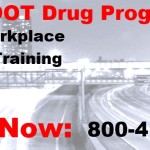DOT Supervisor Training
now browsing by tag
What types of testing are you required to do?

What types of testing are you required to do?
If you are required to have a DOT drug testing under the regulations for motor carriers found in the Code of Federal Regulations (CFR) Title 49 part 382 and 40 , then there are 5 types of drug and 4 types of alcohol testing you must do when required.
DOT approved drug testing for all drug screening is a NIDA 5 panel drug screen, collected at a complying collection site, packaged and shipped in a complying chain of custody processed, tested at a Federally approved clinical laboratory, and reported by a Medical Review Officer (MRO) following DOT guidelines for handling results.
DOT approved alcohol testing comes in two types and two approved methods. The initial screening can be done by any Federally approved breath or saliva screening method. However if an initial alcohol screening test is above the allowed limit, then a second confirmation test must be done using a federally approved Evidential Breath Testing device (EBT). Blood testing is not allowed for either the initial screening or confirmation testing.
Pre-employment drug testing (no alcohol)
The first type of testing is pre-employment drug screening of new employees who are required to be a in a drug-free workplace program. Typically those are employee required to hold a CDL license. There are exceptions to the rule for pre-employment testing (click here to see the post covering it detail).There is no required pre-employment alcohol testing.
Random drug and alcohol testing
Random drug and alcohol testing is to be submitted to by covered employees (generally CDL holders) who have been selected by a scientifically random method at the rate required by the regulations. An employee who has been notified of a required test must proceed immediately for testing. They may not refuse, interfere with, or tamper with the testing in any way or it will be considered a refusal which carries the same consequences as a positive result.
Post-accident drug and alcohol testing
Whenever a covered driver has an accident that either results in an injury to any party, requires any vehicle involved to be towed, or results in a citation to the CDL driver, they are required to submit to post-accident drug and alcohol testing. They are to have the testing done as soon as possible which can sometimes present some challenges depending on the location of the accident and the hour of the day. There are some cases where if the testing is delayed too long it can be skipped but there is some extra documentation required to explain the delay/omission of testing.
The last two types of testing are both for employees that are returning to work after a positive (or violation with the same consequences).
The first is Return to Duty drug or alcohol testing (depending on the circumstance). It/they must be administered and return negative before an employee is allowed to return to safety sensitive duties.
The second is Follow Up testing. This type of testing can vary in frequency which is determined by a Substance Abuse Professional (SAP) who makes the determination (following the DOT guidelines) when/if an employee is allowed to return to safety sensitive duty and how often they are to have follow up testing.
Supervisor Training Required by the DOT

Supervisor Training Required by the DOT
When you're setting up your new drug-free workplace program, one of the crucial areas to make sure you get right is your required training of supervisors. What type of supervisor training is required?
Supervisor reasonable Suspicion Training
The regulations state: “Each employer shall ensure that...” all supervisors of CDL holders “...receive at least 60 minutes of training on alcohol misuse and...60 minutes...on controlled substances use.
The purpose of the training is to familiarize supervisors (of CDL holders) with “...the physical, behavioral, speech, and performance indicators of probable alcohol misuse and use of controlled substances to determine whether reasonable suspicion exists to require a driver to undergo testing...”
In practical terms this is to ensure that those who are supervising CDL holders will be able to spot a drug or alcohol problem with the employee and deal with it proactively.
The consequences of not doing the supervisor training can be devastating to the public, to the employee, and to the company both financially and legally.
In one case I knew of a CDL driver in a semi veered off the road and ran over and killed a State Trooper who was doing a traffic stop on the side of the road. It turned out that the driver (who survived) had used controlled substances and was severely impaired.
In this case the problems for the company potentially went far beyond the cost of damages and insurance rates. When an accident like that happens it spurs an investigation into the employer too, and the authorities will be looking to see if the required supervisor training was done.
They would want to see the records of who was trained, and any records pertaining to the employee. If the company had done everything required that would go a long way to mitigate any liability on their part.
However if they hadn't done the required supervisor training, then they would be in trouble, possibly with state and federal authorities, likely to be sued for negligence, face stiff fines, and possibly face criminal charges for endangering the public. Additionally the federal DOT can determine a company deserves a Public Interest Exclusion (PIE) and shut them down for good.
Mydrugtestingprogram.com offers complete supervisor training that complies with the DOT regulations. Its a part of our membership and is available 24/7 to download and play or stream online on any type of device. We also provide a Supervisor reasonable Suspicion Training Certificates to those completing the training and submitting the “Post Test.”
 D5 Creation
D5 Creation